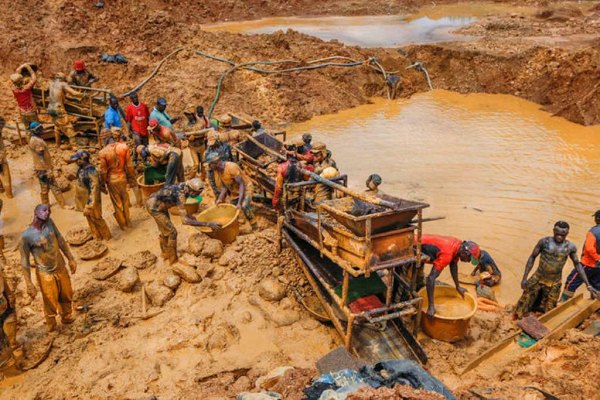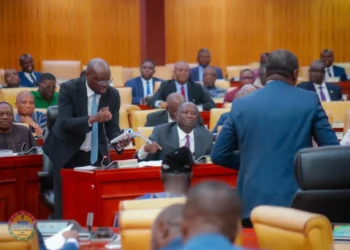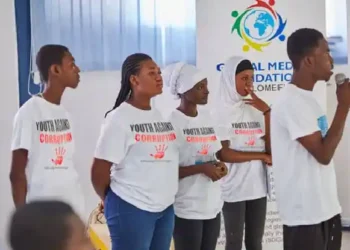The activities of illegal mining widely known in the Ghanaian setting as ‘galamsey’ continues to be a severe threat to the sustenance of forest, farmlands and water resources in the country.
Even though illegal mining activities (galamsey) are not a recent phenomenon in the country, the use of heavy machines such as excavators bulldozers, and chanfans is a recent phenomenon destroying forests, farmlands and river bodies.
The activities of illegal mining in the country began several decades ago. However, the government of Ghana first-formed action to deal with it began in the year 1989 which took the form of the legalization of small-scale mining known as the ‘Small-Scale Gold Mining Law, PNDC L I 218’.
The passage of the law was later accompanied by a military intervention to curtail the activities of illegal miners, yet the passage of the law to legalise small-scale mining and the military operation could not resolve the issues surrounding the activities of illegal mining in the country.
Later, in September 2006, President Kufour’s administration announced an operation known as ‘Fight Against Illegal Mining or Operation Flush Out’. It was a nationwide military exercise to sweep illegal miners who were expanding to legal mining sites and causing destruction to the natural environment.
The government intended to earmark areas for ‘galamsey’ after it halted the operation of illegal miners but similarly, this never happened and immediately illegal miners went back to their ‘galamsey’ sites.
Later in May 2013, the government under President John Mahama commissioned its five-member Inter-Ministerial Taskforce to clamp the activities of illegal mining mainly due to the rising involvement of Chinese migrants and the use of heavy equipment in illegal mining at the time.
Among other things, the Taskforce was tasked with arresting and prosecuting all Ghanaians and foreigners involved in illegal small-scale mining, seizing equipment belonging to illegal miners and deporting all non-Ghanaians involved in the activity. Also, Ghanaians who have sub-leased their concessions to foreigners should have their licenses revoked.
Although the crackdown by security reduced the number of illegal miners, the work of the task force could not wholly stop illegal mining.
The failure of the above programmes to crack down on illegal gold miners led to the launch of the campaign against illegal mining by the ‘Media Coalition Against Galamsey in 2017.
Against this backdrop, President Akuffo-Addo’s administration responded and established the Inter-Ministerial Committee on Illegal Mining in 2017. President Akuffo Addo is reported to have said that he was ‘prepared to put his presidency on the line to stop the destruction of the environment’.
The Committee later launched Operation Vanguard to end the activities of small-scale illegal mining, particularly in the Ashanti, Eastern and Western Regions. The operation later targeted the Central Region. Operation Vanguard was a Joint Military Police Taskforce comprising 400 servicemen from the military and police service.
All these attempts likewise those in the past have not solved the problem of illegal mining and the destruction of forests and water resources in the country.
The Evil Of ‘Galamsey’
The Food and Agriculture Organization in 2010 estimated Ghana’s deforestation rate at 135, 395 hectares per year while a report by JoyNews revealed that more than 19000 hectares or about 2% of cocoa plantations are destroyed by ‘galamsey’ operations in the country.
These precarious figures cast a dangerous shadow that in a few years to come, there will not be any primary forest in Ghana. Cocoa production for instance, slumped by 34% in the first six months of 2022 compared to 2021 according to data from Ghana COCOBOD.
According to research, it is estimated that between 13% and 17% of Ghana’s population have some form of renal function impairment. This equates to between 4 million and 5.2 million citizens.

Thus, the prevalence of chronic renal disease in Ghana has approximately doubled in the last 10 years with some health professionals attributing it to the devastating impact of illegal mining on water bodies and the environment.
Despite claims that ‘Operation Halt’ had reduced Chinese illegal miners in the country, it is public knowledge that members of the Taskforce and other military men protected Ghanaian illegal miners and their Chinese collaborators

According to Professor Frimpong Boateng, Ghanaians will soon experience the harmful consequences of the activities of illegal mining in the country very soon.
“We can all close our eyes and bagatellize the destruction of the environment and its biodiversity, but the reality of these criminal actions by people who have no conscience and love for the country will be evident in the near future if not soon”.
Professor Frimpong Boateng
Professor Frimpong Boateng, whose report has become a centre of debate in recent times alleged that high-ranking government officials are deeply involved in galamsey.
The Bongo legislator, Edward Bawa on the other hand alleged that political parties in opposition even promised to provide a haven for illegal miners when elected to power.
It is, therefore, without doubt that Ghana’s inability to tackle and fight the activities of illegal mining is largely because politicians are the key drivers and beneficiaries of illegal mining activities.
Due to the deep involvement of politicians in illegal mining in the country, prosecutions of both local and Chinese miners have been unsuccessful. Some politicians who have mining concessions even threaten government officials who question their illegal activities.
As evidenced in the past, in instances where these illegal miners are arrested, they are mostly discharged due to their political connections. The fight against ‘galamsey’ has been an ineffective course of action which has led the country nowhere or produced no results simply because the perpetrators, enablers and beneficiaries are the politicians themselves.
Until, the main perpetrators, enablers and beneficiaries are uprooted the fight against ‘galamsey’ remains a ‘blind alley’.
READ ALSO: Volta NDC Appeals For Support For Akosombo Dam Spillage Victims





















